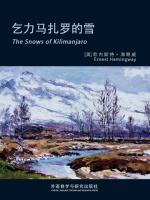RegretandRedemption
奥利奥派
Ernest Hemingway’s The Snows of Kilimanjaro is not merely a story—it is
a searing meditation on mortality, wasted potential, and the redemptive
power of self-awareness, wrapped in prose as spare and precise as the
African landscapes it evokes. At its core, the tale follows a dying
writer, Harry, stranded on the African savanna, his life flashing before
him like a fragmented dream. Hemingway’s genius lies in how he weaves
Harry’s regrets—unwritten stories, lost loves, and a life squandered on
comfort instead of courage—into the stark beauty of the African
wilderness. The “square top of Kilimanjaro,” that “great, high, and
unbelievably white” monument, looms as both a physical destination and a
metaphor for transcendence: Harry’s final, fevered vision of the
mountain becomes a stand-in for the artistic and personal greatness he
never achieved in waking life. Hemingway’s prose is a masterclass in
economy and resonance. Phrases like “the rain so thick it seemed like
flying through a waterfall” blend visceral imagery with emotional
weight, while the hyena’s “strange, human, almost crying sound”
underscores the story’s unsettling intimacy—death, here, is not distant
but breathlessly close, a companion to Harry’s last hours. What
elevates the story beyond a mere tragedy is its honesty about human
frailty. Harry is not a hero but a flawed man, and his death is not a
triumph but a reckoning—a reminder that life’s value lies not in
avoiding regret, but in the courage to confront it. In the end,
Kilimanjaro’s snow becomes a symbol of both loss and absolution: Harry
may never have climbed the mountain in reality, but in his final
moments, he ascends to a place of truth that eludes most in life. In
sum, The Snows of Kilimanjaro is a work of devastating beauty—a
testament to Hemingway’s ability to turn pain into art, and regret into
a timeless meditation on what it means to live, love, and leave behind a
legacy. It is a story that haunts long after the final sentence, urging
readers to look inward and ask: What mountains do we long to climb, and
what stories will we leave untold?



 京公网安备 11010802032529号
京公网安备 11010802032529号